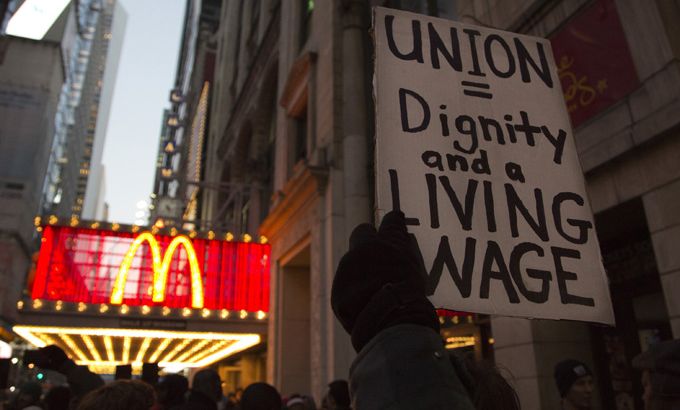
US guest workers: A captive workforce?
Students protest against appalling working and living conditions they endured as part of a cultural exchange programme.
They were brought to the US as guests – but treated like slaves. That is the accusation being made by more than a dozen guest workers based in Pennsylvania, who on Thursday took their campaign to New York’s Times Square.
|
“This is really a story about McDonald’s, really a story about how this is one more company that has hijacked this guest worker programme to its own ends, to bring in cheap labour and have a practically captive workforce working in the stores. The students are demanding that McDonald’s take responsibility for what happened within its franchise, that McDonald’s pay attention to labour standards and labour conditions …” – Saket Soni, the executive director of the National Guestworker Alliance |
They are part of an estimated 100,000 students entering the United States each year on J class visas – a system that is intended to be part work and part cultural exchange but labour rights campaigners say that system is being exploited by companies looking for cheap labour.
Keep reading
list of 4 itemsBiden labels Japan and India ‘xenophobic’ along with China and Russia
KFC Malaysia temporarily closes outlets amid Gaza boycott
Turkey says it halts trade with Israel over Gaza aid access
In this latest case, students say they were underpaid and forced to live in overpriced, crowded housing and that the only culture they have been exposed to is the inside of a McDonald’s.
And the fast food chain released this statement on Thursday:
“We take the well-being of the employees working in McDonald’s restaurants seriously. We began investigating the situation in Pennsylvania immediately upon learning of the issues involved. The franchisee has agreed to leave the McDonald’s system. We are also working on connecting with the guest workers on an individual basis to most effectively address this situation.
“Finally, we are providing information to franchisees who may participate in the guest worker program to ensure they understand both the letter and spirit of all the requirements of the State Department’s J-1 Visa program, as well as the expectations for full compliance by McDonald’s.”
But these students are not the first to complain, neither is it the first time that the State Department’s J1 visa program has faced criticism.
|
“I think the more important question now is: why are McDonald’s using the J visa to hire low-skilled workers to work in restaurants? This country does not have a low-skilled guest worker visa programme to bring in people from abroad, with the knowledge that they’re going to be working in these types of industries, they are going to be working hard … they’re not bein fooled into it by thinking it’s a cultural exchange programme.” – Alex Nowrasteh, an immigration policy analyst from the CATO Institute |
In August 2011, around 400 guest workers walked out of a warehouse run by a Hershey’s subcontractor, also in Pennsylvania. A few months later, a criminal gang was found to have used J-1 visas to hire eastern European women to work in a strip club.
In December 2010, an Associated Press investigation uncovered a series of abuses faced by students on the visas. Among their findings: students who made $1 an hour, after deductions for housing and other expenses and others who had to “hotbunk” and sleep in shifts.
Both the state department and the labor department have launched separate investigations into the guest worker programme – even as a bipartisan Senate group recently appeared to recommend expanding similar temporary work programmes as part of US immigration reform.
Joining presenter Shihab Rattansi on Inside Story Americas, to discuss the United States’ guest worker programmes are guests: Josh Eidelson, a former union organiser who writes on labour issues for The Nation magazine; Alex Nowrasteh, an immigration policy analyst from the CATO Institute; and Saket Soni, the executive director of the National Guestworker Alliance – the organisation that helped the students organise the protest.
|
“We had total of 91,600 participants … a vast majority had very good experience with program. There have been problems; we have been working on them. We have been working over past year to strengthen our relations, health and safety includes among other things, more closely vetting the types of jobs they are eligible for, every single job, every single employer, overnight hours, prohibiting jobs in isolated areas, proper housing and transportation. “We have done lot to improve access they have to us, direct contact with us including through 24-hour help line, through regular monitoring of all placement. Ongoing effort on our part to ensure that those who come here for this program are not only safe and secure, but that students have a terrific experience” – US state department’s response to complaints |